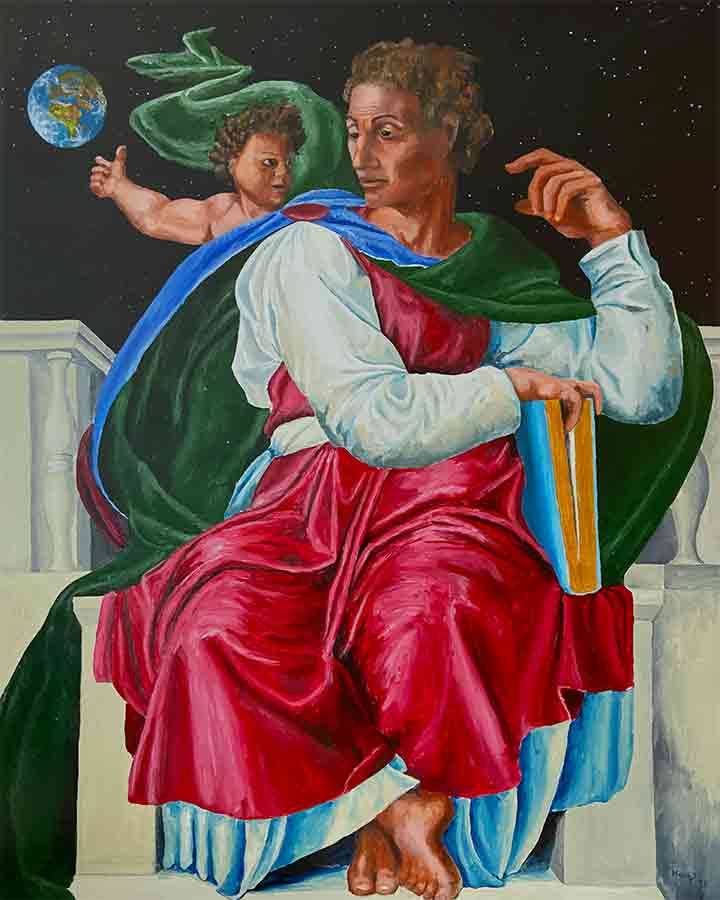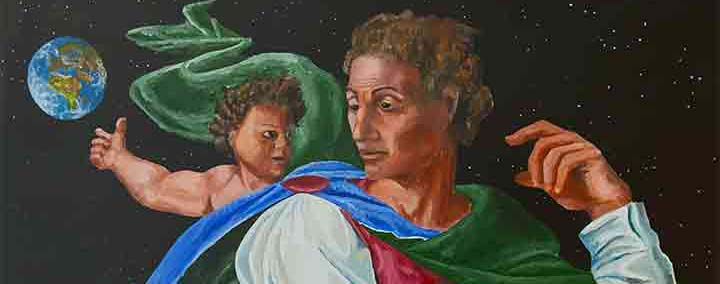
What’s been going on for all this time?
Human beings are naturally egocentric and a bit self-absorbed. After all, we spend our days interacting with the world around us and we define the world through these daily interactions, with us as the center of attention. Of course things happen to other people, but we experience their responses remotely or second-hand, not as direct give and take between the world and our inner self. It’s understandable that we see ourselves as the center of action and meaning, and how this carries over into religion. But the reality is, Homo sapiens are latecomers to the party, and we may overrate our importance in the grand scheme of things. Given the age of the universe and our late appearance on the stage of life, there are questions we should consider. We tend to view the God-to-universe connection as solely a relationship between God and humankind. But what was he doing for the 13.8 billion years before we arrived?
I realize large numbers like 13.8 billion are hard to relate to and thus become a bit abstract. I felt it might be helpful to scale the history of the universe into a single day, starting at midnight with the big bang and ending 24 hours later with the present day. Within our scaled timeline, the earth forms during the late afternoon at 4:10 p.m., like an awkward teenager who spent most of the day sleeping. Soon after that, at 4:41 p.m., water appears on the earth’s surface, pooling in the low spots around the planet. The appearance of water is fortuitous since it is the sine qua non for life on our planet.
Life takes advantage of the soupy pools of early water, and at two minutes after 5:00 p.m., chemosynthetic life emerges. No significant free oxygen is yet available, and photosynthesis has yet to arrive, so the best life can create is microscopic critters digesting inorganic delicacies like hydrogen sulfide and iron.
Fortunately, in the early evening at 5:44 p.m., single-cell life emerges in the form of cyanobacteria, and these blue-green algae start using the sun’s energy to produce food. As a bonus they expel free oxygen, and slowly the atmosphere starts changing. But the evolutionary jump from single-cell to multi-cellular life is a tough nut to crack, and it is not until 10:15 p.m.that larger creatures appear.
Finally, at three minutes after 11:00 p.m., complex life explodes onto the scene, and the real party begins. The dinosaurs arrive at 11:33 and disappear 20 universal minutes later at 11:53. The minutes are ticking by, and proto-humans climb down from the trees at 11:59 and 29 seconds. Precisely 29 universal seconds later — at 11:59 and 58 seconds — Homo sapiens appear and start using their marvelous new brains to outwit many other species.
We are getting close at this point, and 0.13 seconds before the stroke of midnight, humans gain enough existential awareness for civilization to take off. Interestingly, when scientists measure the blink of an eye, they place its duration at 100 to 150 milliseconds or about 0.13 seconds. So, during the long history of the universe, in this last blink of an eye, the Torah, Bible, and Quran are written, Buddha enlightens us, and the Hindu gods fight many battles.
One of the problems we face with this universal timeline is that the first chapter of Genesis covers the entire history of the universe, except for the last 130 milliseconds. Then the following 1,550 pages in my New Oxford Bible expound on the last blink of an eye. Conflating the creation of the universe with the advent of modern human beings gives a false impression that the two are closely connected. When reading Genesis, we fail to appreciate the 13.8 billion year gap between creating the universe and the emergence of humans several paragraphs later. Once we understand and appreciate the time scale, it seems fair to ask, “What was God doing for all of that time?”
To be clear, I am not making a statement about the existence of God. People’s unique religious beliefs are theirs alone. But I am suggesting we should adjust our perspective to realize that humanity is more of an afterthought to the grand history of the universe than a driving force. Things were humming along nicely for virtually all of cosmic history before we arrived.
I have also left undiscussed the situation before the creation of the universe. Presumably, an eternal God would have been around to do the creating. But even the word “eternal” belies a false impression since time and space as we know it would not have existed before creation, and without time, the word “eternal” has little meaning.
Since the known universe extends across some 93 billion light-years, the potential for lots of activity, sentient or not, was, and still is, high. Presumably, God was tending to the matters at hand before he dropped in on the earth’s evolutionary results.
God and Time
I realize some people may be offended by the thought that humans are not necessarily the sole focus of God’s attention. But there is an entire universe out there vying for his attention. Others have explained to me that God is a great multi-tasker and can be in many places at once. In Christianity, this panentheistic view, stating that God intersects with all parts of the universe and also extends beyond time and space, appears to be acceptable as long as you don’t call it Panentheism. Since I have a difficult time grappling with existence outside of time and space, Panentheism gravitates towards Pantheism — God is everywhere, the universe and God are one. But this concept doesn’t fly with Abrahamic religions since it precludes God’s existence before the big bang.
Consideration of what happened during this unaccounted-for time before humans appeared is met in other ways by some of the faithful. I have heard the problem dismissed with the catchall “God beyond time,” or “unconstrained by time.” Since we are out on the edges of metaphysical speculation without much reality to back us up, we will accept that this belief may be true. But the “beyond time” thesis unlocks some other sticky questions.
If time is a moot point in the man-God relationship, then time becomes irrelevant in our religious practices. Praying for a sick person can be done with equal effectiveness before they are sick, while they or ill, or after they recover. Time is irrelevant. In fact, praying for them after they recover ensures your prayers are answered. Additionally, if time is irrelevant, determinism becomes the rule of the day.
Without time, it is foolish to speak of one thing happening before another. All events in the universe merge into a single event. I presume this leads to views espousing how all that will happen has happened, or all that has happened and will happen is pre-ordained. As confusing as this concept is, it seems to also make praying unnecessary since there are no legitimate future events to pray for.
The most common explanation I have encountered for the lost time at the beginning of the Bible is denial it ever existed. Many creationists hold that the earth is only five thousand years old, so there is no unaccounted-for time. The whole history of the universe really is only in a blink of an eye. This course of inquiry quickly leads to the conclusion that the laws of physics are nonfunctional, and the universe is an elaborate ruse specifically designed to deceive us.
Creationist thinking could also fully support the hypothesis that we were all brought into existence five days ago and provided appropriate memories, made-up histories, and props like cities, homes, jobs, and Bibles. We could go even farther with this idea and posit we don’t exist at all. We are just flotsam in an energy field being manipulated to believe we are human.
There is no end to the mind-bending games we can play to avoid the facts. Our egos get upset when we realize we are not the center of the universe. I agree it is existentially unnerving to realize we are such a mind-numbingly small and insignificant part of the universe in terms of both time and space. But facts are facts.
Obviously, I can’t propose an answer to the question of what God did for the 13.8 billion years before we arrived. But I can acknowledge the extent of my ignorance and be a bit more humble in assessing my connection with the universe. Accepting the fact that I am single pixel in a very large picture certainly does not diminish the quality of my daily life. It may actually improve it. While pondering the situation, I was reminded of Verse 25 of the Tao Te Ching, or at least my interpretation of it:
In the beginning, there was the Void, and it was formless and unfathomable.
From the Void, God stirred and gave birth to the universe.
What can we say about the nameless force that flows through God’s Void?
We shall call it the Tao.
It flows through all things in the universe.
It cannot be touched, tasted, seen, or heard, but we can experience it within.
It was there before the universe was birthed, and it will be there when the universe has returned to God’s formless Void.
The Tao can only walk along its own path.
Read about art, science, the environment, and more on ArcheanWeb
ArcheanArt featured on GeoGalleries and Etsy
For reflections on life’s journey and thoughts on the Tao Te Ching read: In Search of a Path
Read my recent fictional adventure on the origins of life
See my medium articles and publications:
Environmental Articles on EarthSphere
Stories, Life Observations, and more on Dropstone
